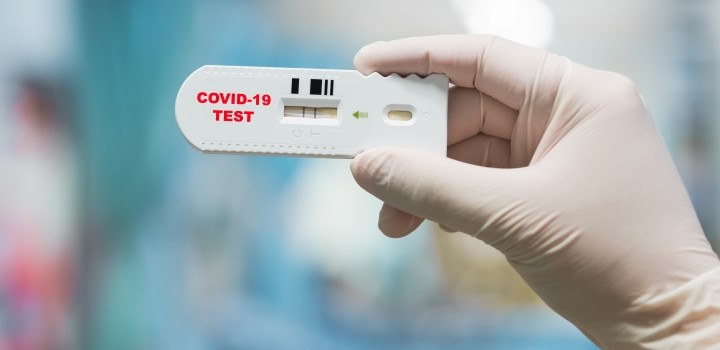Antigen testing for COVID-19 is now available in South Africa

The best way to test for COVID-19 is through a PCR test. However, a second kind of test - called an antigen test - provides a faster, relatively cheap and important alternative form of testing in very specific contexts.
In the time of a global pandemic, healthcare authorities across the world try to increase the availability of critical medical products, like the availability of tests to detect whether someone has contracted COVID-19.
"This is especially important in the case of a disease like COVID-19 where we have no medicine that directly combats the virus and have not yet vaccinated enough people to provide a degree of protection from illness in the community," says Dr Noluthando Nematswerani, Head of the Discovery Health Centre for Clinical Excellence. "Testing is critical in identifying people who have contracted a disease and directing them to self-isolate and focus on their healthcare needs while preventing the spread of infection to others."
There are two types of diagnostic molecular tests for COVID-19 - they diagnose you while you have an active infection (and so can infect others). These are:
- PCR (polymerase chain reaction) tests - the gold standard for testing, as it is the most sensitive (high chance of picking up an infection when it is present in your body) type of test we have access to. Results take from 24 to 48 hours but may be longer in cases where there is widespread community outbreak of infection with high numbers of people requesting testing. Read more on PCR testing.
- Antigen tests - an important alternative to PCR tests in specific contexts (explained below).
There is also a third type of test available - an antibody test - that is useful in identifying people who have already had the infection and may no longer be infectious. This type of test is not used to diagnose an active COVID-19 infection. Read more on antibody tests.
How is South Africa using antigen tests?
"The latest guidelines around the use of antigen tests by the National Department of Health approve the use of antigen testing in South Africa in specific contexts, always with the aim of reducing the transmission of COVID-19," says Dr Nematswerani.
In South Africa, antigen tests have been approved for use in line with the World Health Organisation (WHO) recommendations:
In confirmed outbreak settings
- Testing symptomatic patients in areas where community spread has been detected
- Screening of at-risk individuals in the community
- Screening high risk groups such as healthcare workers and essential staff in areas where community spread has been detected
- In the process of contact tracing, to test people who are contacts of both symptomatic and asymptomatic cases.
Benefits of antigen tests
Antigen tests are:
- Relatively inexpensive
- Able to quickly detect whether a person has COVID-19. "The fact that antigen tests return a result within 15 to 30 minutes means that authorities and healthcare workers can quickly triage people and patients and manage them appropriately," says Dr Nematswerani.
- Available in areas that are located far from pathology labs (where PCR tests are processed) and can assist with critical decision making in areas where outbreaks of COVID-19 are detected. Fast identification of people who have COVID-19 allows them to quickly be directed to self-isolate to control the spread of infection."
So, what are antigen tests, and how do they work?
Facts about antigen tests:
- Antigen tests (also called "rapid diagnostic tests") detect specific protein on the surface of the virus
- A nasopharyngeal specimen (sample taken from the back of the nose) is taken - in a process carried out by a healthcare professional.
- Once the sample has been obtained, it's processed using a reagent fluid that breaks up the viral particles and expose the antigens detected by the test. Then, after a short time the sample is applied to the testing strip and a result is obtained.
Did you know?
- Rapid antigen tests are more reliable when they are done on patients who have symptoms of COVID-19 and so likely have a high amount of virus particles in their system - called a high viral load.
- This means that the timing of the test is crucial. Ideally a rapid antigen test should be done within the first five to seven days of the onset of symptoms.
References
- https://www.nicd.ac.za/diseases-a-z-index/covid-19/covid-19-guidelines/antigen-testing-guideline
- https://www.cdc.gov/coronavirus/2019-ncov/lab/resources/antigen-tests-guidelines.html
- https://www.who.int/publications/i/item/antigen-detection-in-the-diagnosis-of-sars-cov-2infection-using-rapid-immunoassays
- https://www.ecdc.europa.eu/en/publications-data/options-use-rapid-antigen-tests-covid-19
- https://www.fda.gov/consumers/consumer-updates/coronavirus-disease-2019-testing-basics
- https://www.fda.gov/medical-devices/letters-health-care-providers/potential-false-positive-results-antigen-tests-rapid-detection-sars-cov-2-letter-clinical-laboratory